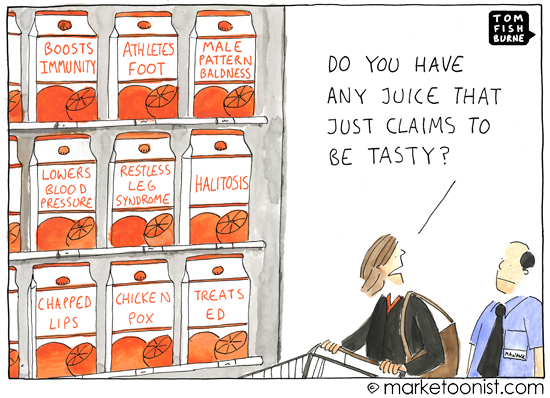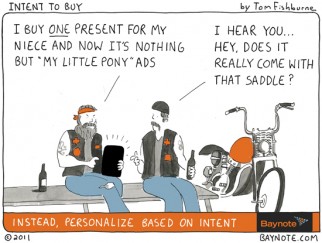I thought the “Treats ED” juice claim in this cartoon was an exaggeration until I learned that the FDA warned POM Wonderful last year to stop making that exact claim. The FDA also sited POM for claims related to LDL cholesterol, promoting a healthy heart and prostate, reducing the length and severity of colds, and slowing prostate tumor growth.
There’s a health claim arms race underway in food marketing. One of the fastest growing food categories today is functional foods, which are fortified to give extra health benefits.
Functional food marketing can help breathe new life into an established brand. But there are risks.
One of the most daring brands has been POM Wonderful. Aside from the FDA warning, POM caught flak in the UK from the Advertising Standards Authority for it’s “Cheat death” ad, featuring a POM bottle wearing a broken noose.

Yet beyond the regulatory question, I think there’s also a brand fit question. How far can a brand stretch into heavy-duty health claim territory without turning off its core audience?
I think it depends a lot on the brand. POM Wonderful is obviously consumed by those who know and care about the power of antioxidants in pomegranate juice. What about other food brands with a different heritage? How much permission will consumers give them to stretch in health?
When I lived in the UK, I was surprised when innocent rebranded innocent Juicy Water as This Water, stripping off the beloved innocent brand name It’s a bold move to drop the halo of a well-known brand. This Water has added sugar, and they wanted to keep the innocent brand pure and focused. I like how they included this description on the This Water website: “We’re an entrepreneurial bunch brave enough to take the innocent brand off our label”.
I think the emerging world of functional foods will prompt brand teams to ask similarly brave questions on where to draw the line.



Denise says
Hmmm, it seems you are still playing on the age-old belief that good-for-you food doesn’t taste good. Perhaps Marketers feel they can win that war with the most outlandish healthy claims.
Martin Chillcott says
Not exactly health related, but I always find the addition of a spurious adjective to products amusing.Whenever confronted on a restaurant or pub menu with ‘home cooked’ (insert food item here) , I imagine that they have some nice old lady held hostage in an attic preparing the said item, in between bouts of knitting cardigans for cats. Alternatively, when the use ‘delicious’ is added e.g. “delicious steak pie” I often wonder whether a revolting version or the merely mediocre is also available. ‘Delicious and home cooked’always puts me on BS alert
Nazura Jalil says
All the trends are pointing towards the health and wellness platform but not every brand or product can easily adopt it. From my experience, where the products are used as secondary products (eg to enhance food and beverages) for indulgence purposes, going with functional ingredients may just don’t click with the consumers. Frequency of consumption may reduce due to health awareness, but consumers may still want to enjoy the products as an escapism and in these moments of indulgence, they would want the “real” product, not something loaded with breakthrough functional healthy ingredients that would “kill the joy” out of the consumption. The action for brand/product managers is to get a high value out of these consumption moments.
MktVoice.blogspot.com says
Additionally, marketers fall in the trap of overpromising and the regulatory entity is a good way of bring us back to reality. Additionaly to Nazura Jalil point of view, be carefull there is a Health and Wellness trend but still 60% of the Soda category is regular Soda!!! So consumer and us say we want to be healthy but only few of them take them to action.
Dale says
What pompous claims – and it’s expensive, too.
Bill Carlson says
And do consumers actually believe any such claims? Are we considered suckers for cure-all potions? I wonder if adding health claims actually matters to sales — well, there are some which are based in some understandable reality like “low fat” but “cures XXX” or “minimizes potential of YYY”? At some point, would seem all products in a category would reach parity in terms of the product (ingredients, etc.) and its claims, so perhaps some desperation for differentiation sets in — one of those things which sounds good in the conference room but not sure matters so much on the shelf…
Peter Leahy says
I used to work with a juice company we learned two things the hard way: (a) you need to evolve from product/feature language to communicating the product’s benefit and (b) you need to understand (and usually) expand your frame of reference. On the second point, you may consider your product healthy because it’s all natural, 100% juice and provides ‘real’ vitamins, but the consumer may equate it with something like VitaminWater, which is just water, sweetener and a bunch of junk thrown in.
Deb M says
The public is gullible and they love to buy into this stuff….rarely do they do any critical thinking….sound bites rule…and so marketing exists!
Chrystian Ramirez Davi says
It’s not all about juices and food!!!… as you might find it incredible, other categories such as Soaps (body cleansing) are looking and getting inspired from the antioxidants, vitamins, “power me” trends… Yes, that is true!… have you heard about Açaí? the new “powerfruit”?… or what about Goji Berries? or Pitangas?… All these fruits are already used by Natura and other Brazilian beauty companies… and, the most important thing I believe is: the consumer is now understanding and wanting to know how all these miracle ingredients work! (you just have to be careful on the legal side!).
MaryJayne Zemer says
What’s frustrating is that food brands, who are trying to make themselves healthier than they really are, are risking far more than market share.
Making food look healthier than it distorts people’s perception of what’s healthy (which has been clinically proven). Take a stroll down your local grocery’s cereal aisle and you’ll see an interesting new phenomena- nutrition labeling on the front of cereal packaging. This ‘front of packaging labeling’ isn’t regulated by the FDA, and it’s being used to make unhealthy cereals appear healthier than they really are- by showcasing only selective nutrition information on the front of the package. This packaging was created because cereal manufacturers knew consumers would be confused and persuaded by it.
Ironically, these same brands claim their mission is to improve our health. It’s time for us to harness the power we do have (where we spend our money) and switch our brand loyalty to the brands that are authentically, transparently, and positively contributing to the world we want to live in 10, 20, 50 years down the line.
tomfishburne says
Hi all,
Insightful feedback from everyone this week, many thanks. This is a hot button issue. Marketing Week included my cartoon this week in their newsstand issue focused on functional foods: http://www.marketingweek.co.uk/analysis/features/authenticity-adds-weight-to-health-claims/3031955.article .
This week’s cartoon goes to MaryJayne. I love her inspired take that food brands “are risking far more than market share” if claiming to be healthier than they really are..
Many thanks,
-Tom
Tessa Stuart says
I’ve just been researching in the UK yoghurt category and a surprising number of consumers are wise to low fat yoghurt “health” claims. “If it’s low fat, then it’s high sugar or other crap” is what they tell me. Go consumers! The tide of awareness is turning re fat in the UK consumer’s mind and it’ll be reclaimed as good, with sugar being demonised.